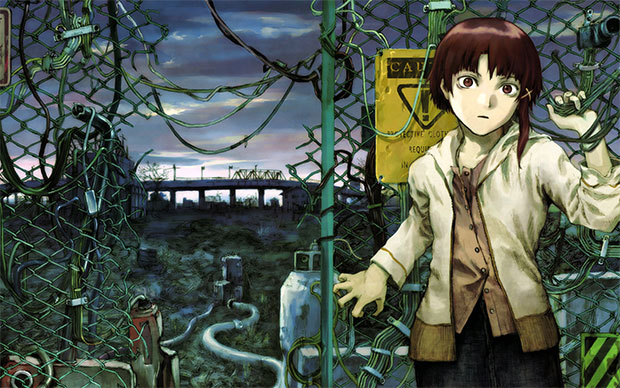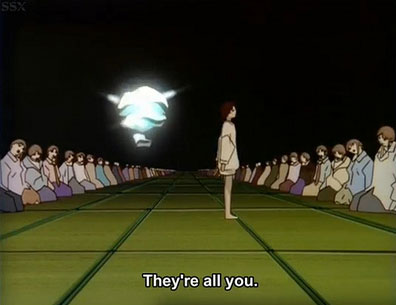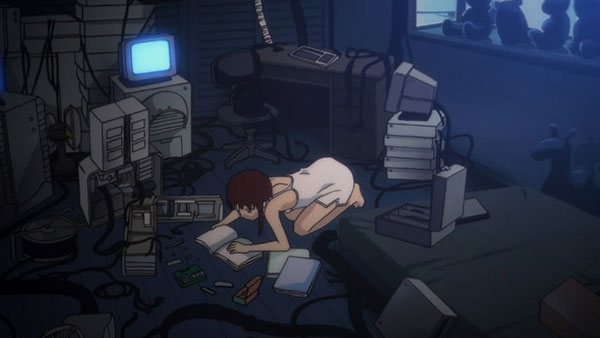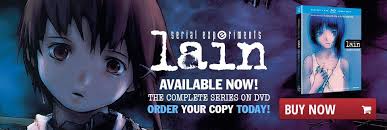Anime Review: Serial Experiments Lain
By Jd Banks

On your daily commute, you might not notice the soft hum of power lines as it filters through the noise of passing cars. Serial Experiments Lain uses the compressed power of this hum to transport its viewers into a mysterious world of cyberpunk.
This 12-episode cult classic follows Lain Iwakura, a quiet suburban teenager trying to uncover the mystery behind her classmate’s suicidal entrance into the a virtual world called the Wire. With the help of modified computers called Navis, Lain learns that the Wire and reality aren’t so different from each other.

In spite of being almost 20 years old, Serial Experiments Lain still relates to today’s technological world. It does this by tapping into one universal theme: disconnection. As viewers watch more of the series, it becomes clear that disconnection also happens in real life. The Internet Age creates a digital bridge to millions of people through social media, but as a result, sacrifices the need to connect with others in a physical and meaningful way. This is why Serial Experiments Lain is considered a disappointment to its producer, Yasuyuki Ueda. In a quote he says, “this work itself is sort of a cultural war against American culture and the American sense of values we adopted […]”.
Most people would disagree with isolation as a sole Japanese theme. Certain splotches in the series are admittedly “the war against American culture”, but not so much American, as it is Western culture. Mentions of knights, the Cheshire cat, and Alice are part of English culture, while nightclubs such as Cyberia, reference early 20th century concepts created in the US and Europe. Even terms like the “collective unconscious” (Carl Jung) and a “true God” (the Bible) are Western concepts. The allusion to God comes from Western religions, but some Japanese people label themselves Christians, so again, this isn’t a completely foreign concept. The only distinctly American references come from fiction and technology, namely Space Odyssey (Hal Power 3000), Snow Crash (Gargoyle), and Apple Computers (Copland OS).
Serial Experiments Lain takes a snapshot of how American values impede Japan’s sense of tradition. If you take a step back and look at the series, you’ll see that the technology represents American culture and Lain’s normal life represents Japanese society. The technology suddenly interrupts Lain’s quiet existence, although always having a small presence in her daily life. This mirrors the same way foreign goods have always existed in small forms in Japanese daily life, even before Commander Matthew Perry forced Japan out of its 250-year peaceful isolation.
Few references to Japanese culture make its way into the series. In “Rumors”, Lain questions the parallel rows of people as they sit on green tatami mats, key furniture in a traditional Japanese household. Other references such as schoolgirls, meals, and suicide are negligible due to their prevalence in other cultures outside of Japan. Coincidentally, Lain

What began as a haunting through the Navis’ emails eventually turns into a mystery for both Lain and the audience. The story seamlessly shifts with a detached tone that leaves gaps between time, Lain’s mental jumps in and out of the Wire, and the other characters’ involvement with the virtual world.
For some viewers, a drawn-out style of story-telling might make the anime feel too slow, but if you’re someone who likes mysteries and strong story development, you’ll find a friend in Serial Experiments Lain. Who knows, after watching Lain, you might just look at power lines and wonder, “What’s that hum?”

The Wrap Up
Pros
- great sounds
- non-linear plot
- timelessness in all aspects
- sophisticated universal themes
Cons
- slow pacing
- a lot technology jargon
- unfinished plot lines



Follow Us!